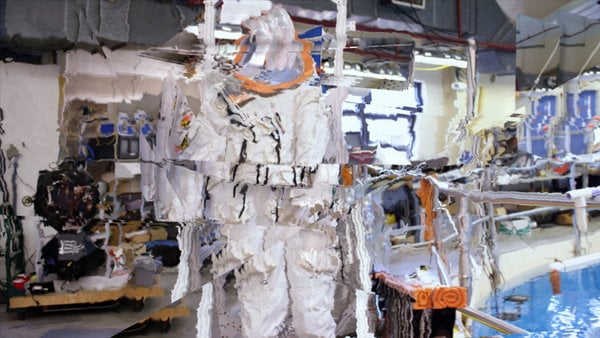
“My eyes adjusted to this incredibly darkness speckled by stars.” So says former astronaut Dave Wolf in Everything and More, Rachel Rose‘s new video work opening October 30 at the Whitney Museum of American Art in New York. A meditation on our perception of the cosmos, the film pairs Wolf’s recollections of his time on board the Mir space station with a wide range of original and found footage.
If you haven’t yet heard of the 28-year-old Rose, it’s probably only a matter of time. After a solo show at London’s Serpentine Galleries, on view through November 8, the video artist is about to enjoy her first American solo exhibition, impressively making her debut at the Whitney, which opened its new Renzo Piano-designed home to much excitement in May.
While the new Whitney’s inaugural exhibition, “America Is Hard to See,” offered a new presentation of classic and contemporary works from the permanent collection, “Rachel Rose: Everything and More” is the second of three planned exhibitions in the Whitney’s new emerging artist series. Jared Madere kicked off the series on October 16 with a lobby installation (which means it’s open free to the public), while a video piece by Sophia Al-Maria is planned for summer 2016.
Rachel Rose, still from Everything and More (2015).
Photo: Rachel Rose, courtesy Pilar Corrias Gallery, London.
Showcasing young artists is “tied into the DNA of the museum,” series curator Christopher Y. Lew told artnet News, citing the “consistent run of emerging artists” shown at the institution since the opening of the old Breuer Building in 1966.
Though Rose, who is represented by London’s Pilar Corrias gallery, is still at the outset of her career, she’s already garnering an impressive amount of praise: she won the illy Present Future Prize at Artissima 2014, and this spring she received the Frieze Artist Award for site-specific installations by emerging artists at the London fair.
Rose’s Whitney exhibition takes its name from Everything and More: A Compact History of Infinity, David Foster Wallace’s 2003 book devoted to pure mathematics. One can’t help but suspect that as a product of the ’90s, the artist grew up harboring a deep-seated wish to attend space camp—although her interest on the topic could just be part of her family heritage. After all, the Rose Center for Earth and Space at the American Museum of Natural History is named after her great uncle, real estate magnate Frederick Phineas Rose.
Rachel Rose, still from Everything and More (2015).
Photo: Rachel Rose, courtesy Pilar Corrias Gallery, London.
The artist sought out the astronaut for Everything and More after hearing his haunting Radio Lab interview about nearly being lost the space during a 1997 spacewalk.
The film’s overall effect is to transport viewers into the void, even during snippets of an electronic dance music show. To capture the feeling of weightless described by Wolf, Rose filmed at the University of Maryland’s Neutral Buoyancy Laboratory, plunging a camera into the lab’s watery depths. She achieved the film’s abstract, vaguely extraterrestrial shots by using an air compressor on liquids such as milk, oil, water, and ink.
Rachel Rose, still from Everything and More (2015).
Photo: Rachel Rose, courtesy Pilar Corrias Gallery, London.
Everything and More will appear on the museum’s fifth floor. Instead of blacking out the room’s floor-to-ceiling windows, Rose has covered them with a translucent scrim, dimming but not fully obscuring the view of the rooftop behind it, full of sculptures from the current Frank Stella retrospective. This unusual arrangement will have the disconcerting effect of merging Rose’s film with the urban scene just beyond the glass, taking advantage of the ever-changing cityscape to layer even more imagery on her densely visual, collage-like films.
“You’re having your own experience of perception,” Lew explained, just as Wolf’s time in space forced him to actively confront the way in which he perceived the universe.
Wolf’s musings compel viewers to contemplate the infinite nature of the cosmos; however, the piece is less about abstraction and more about the way that we experience and engage with infinity in our daily lives.
“Rachel Rose: Everything and More” is on view at the Whitney Museum of American Art, October 30, 2015–February 7, 2016.